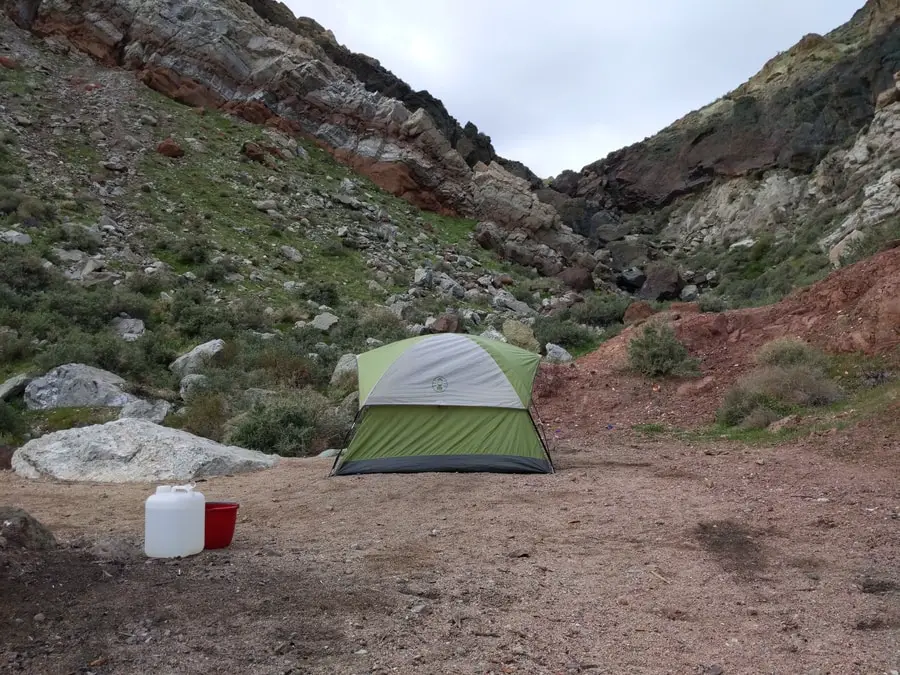
I have been lucky enough to never experience any kind of injury or illness over the years during my camping trips. My experience is just anecdotal, the real question arises when looking at tent camping overall to see if camping in a tent is generally safe to do.
So, are tents safe? Tents and tent camping are generally very safe as an estimated 78.8 million U.S. households were considered camping households in 2018 and the rate of serious injury while camping is dramatically low.
While tent camping is generally safe, there are some precautions that you can take while tent camping to help boost your safety and minimize your risk of injury.
By the way, If you are in the market for a new tent, then you should click here to see the one I recommend on Amazon.
to see the one I recommend on Amazon.
Is Tent Camping Safe?
According to Kampgrounds of America (KOA) in their 2019 North American Camping Report, there were an estimated 78.8 million U.S. households that were considered camping households. A 1.4 million household increase from the previous year. So clearly many Americans enjoy camping in one way or another. In fact, a large majority of them are tent camping as opposed to other forms of camping. 59% of the camping households reported tent camping according to the same 2019 report.
While many people are going camping, the injury and death rate associated with camping is astronomically low. All of the top ten leading causes of death in the United States are completely unrelated to camping or mostly any other outdoor recreational activity according to the Centers for Disease Control and Prevention (CDC). As you will shortly learn, all of the fears that most people have about camping and the outdoors are usually unwarranted because the risk of death and injury is very low.
Are Tents Safe From Fire?
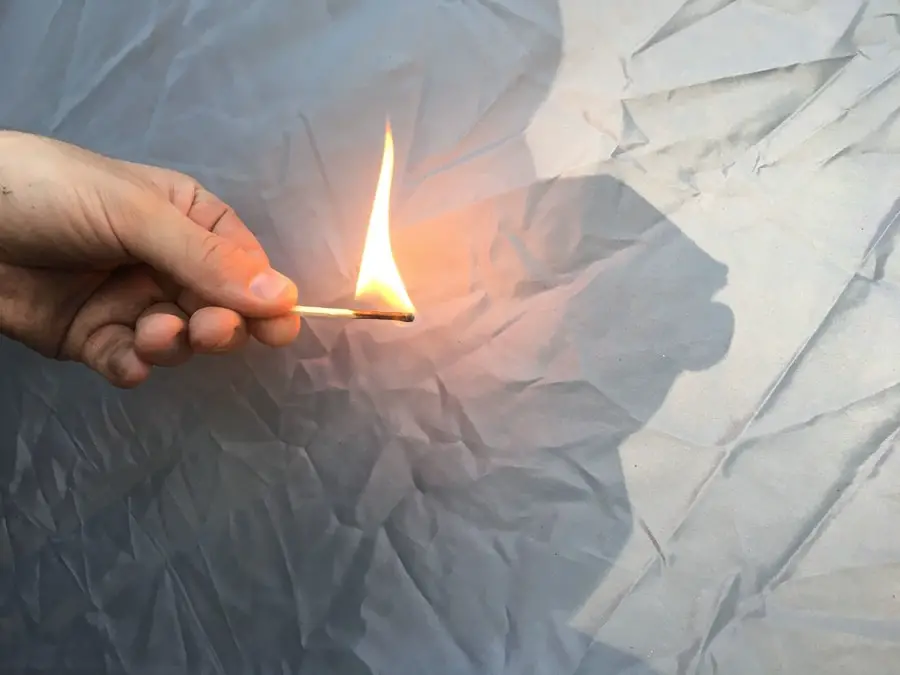
As a general rule, tents are treated with a flame retardant that helps slow down the burning of the tent’s materials. This does not mean that tents are fireproof or even fire-resistant. An open flame should never be used inside a tent or in close proximity to it. A good rule of thumb to follow is that your tent should be at a bare minimum of 15 feet from your campfire.
All tents are supposed to be treated with a flame retardant, but you shouldn’t count on it. Different tents are made from different fabrics and different fabrics react with fire and burn at different rates. If your tent does catch fire, you should only try to extinguish it if you feel it is safe to do so, otherwise getting proper help from a fire department is best.
Your overall risk of fire danger while camping with your tent is really low as long as you follow basic safety standards and keep your tent away from any open flames. If you want to read more about fire safety and tent camping then I highly suggest that you read this article that I wrote because it goes into much more detail on tent fire safety.
Are Tents Safe In High Winds?
Tent camping with high winds is never too much fun. Your risk of injury while camping in high winds is low, but it certainly can be unenjoyable. In order to minimize injury and the effects of high wind, try setting up your tent as soon as possible, and it helps to have a second person assist you. If you can, it is best to orient your tent so that the back of it is facing the direction of the wind.
Tents with lower profiles will perform better in high winds than taller tents. If you are confident that it will not rain then leaving the rain fly off of the tent should assist with airflow and allow the wind to pass through it. Remember that tents are not solid structures, so if the wind is very bad then use common sense and seek a more sturdy structure such as a building or your vehicle.
Are Tents Safe In Heavy Rain?
Any good tent should be waterproof, or at the bare minimum water-resistant. Pretty much all tents today come treated with waterproofing features, but over time these waterproofing features may diminish and you might need to re-waterproof your tent yourself. If you need some more guidance on waterproofing your tent then click here to learn more from another article I wrote.
So if your tent is properly waterproofed then water should not be able to get in from above you. However, water could still end up getting in if the ground you are on becomes flooded. The bottom of your tent could be damaged with small holes and you don’t even know it. That is why you should probably be using a tarp under your tent (Another article I wrote about why you should put a tarp under your tent).
If heavy rain leads to flooding then your best solution is to have already set up your tent in a higher area that is less subject to flooding. Prevention is always better than a solution. Included in prevention is making sure that you are prepared for any kind of weather that you may experience on your camping trip. Always check the weather forecast right before you leave so that you can rest assured that you know you have the right gear, especially if it is going to rain.
Are Tents Safe In Lightning?
It is very important to know that no place outside is safe during a lightning and thunderstorm. The safest place you can be during lightning is inside of a modern building with modern electrical wiring and plumbing because the building will be properly grounded. The next best thing if a modern building is unavailable is a fully enclosed vehicle. A tent is never safe in lightning, nor is being outside in general.
Thankfully, your chances of getting struck by lightning are very very low, but that doesn’t mean you should take it for granted. Always take precautionary measures when lightning is nearby and head inside (not inside a tent!). If you want a full guide on camping and lightning safety then you should read this post that I wrote.
Are Tents Safe In The Heat / Cold?
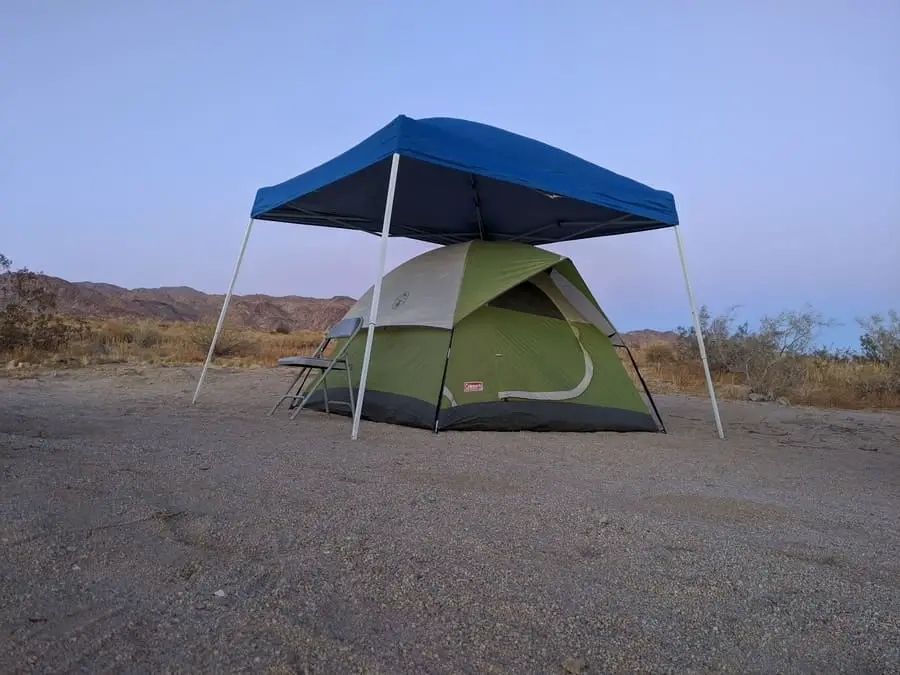
Tents on their own are not very good at protecting you from hot or cold temperatures. A tent is a very thin and relatively flimsy piece of material that serves as a temporary shelter. What will keep you warm in the cold is other camping gear such as a good sleeping pad (link to the one I use), a good sleeping bag, and good cold-weather clothing.
A tent will also not do much to keep you from overheating, in fact, in the sun a tent can become much warmer inside than it is outside. A tent should help keep your skin protected from the sun, but unless it is inside the shade, the internal temperature will become very warm.
Moderately warm and cool temperatures should not carry and additional safety concerns, but exercising common sense should be easy in deciding if the weather and temperature would be a cause of concern if you were to go camping.
Are Tents Safe From Wild Animals?
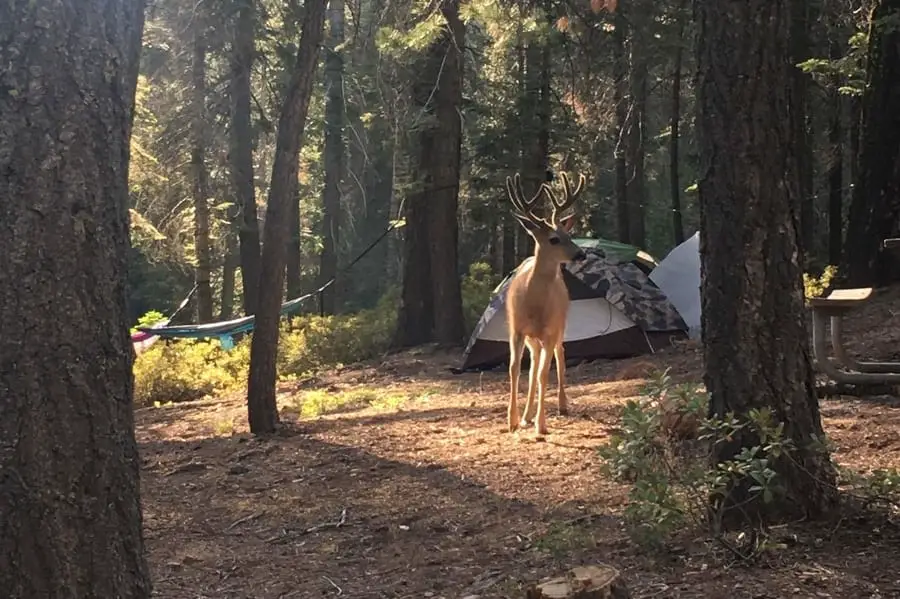
The danger from wild animals always seems to be a concern for those that are generally unfamiliar with camping and outdoor recreation. Wild animals are generally more afraid of you than you are of them, however, it is always important to keep your distance and respect wild animals. As you will learn, the number of injuries and deaths caused by wild animals is very very low when you consider how many people go camping and partake in other outdoor recreational activities every year.
Bears
Bears are probably the first thing that comes to mind when camping and scary animals are concerned, at least in North America. Bear attacks are extremely rare, and most cases are female mother bears defending their cubs because someone, unfortunately, came too close. According to WiseAboutBears.Org there have only been 67 human deaths caused by Black Bears since 1900.
Black Bears are by far the most common bear in North America, but brown bears are present in Alaska, Wyoming, Montana, and Idaho. The CDC estimates that on average only 1 person is killed by bears per year in the United States.
Mountain Lions
Mountain lions are another scary animal that has a wide territory throughout North America, but their encounters with humans are actually pretty rare since they usually know that you are nearby before you will know that they are nearby. Just as with bears, I think that you will be pleasantly surprised to hear how rare an attack or death is from mountain lions.
A total of 125 attacks, 27 of which fatal, have been documented in North America in the past 100 years (source). The average is even less than that of bears. For the most part, if you educate yourself on what to do if you come in contact with a mountain lion, the common advice is to yell, throw rocks, try to make yourself bigger, and just annoy the animal until it retreats, they want easy prey, not something that is going to fight back. Your chances of even encountering a mountain lion are very rare, the chances of getting attacked are even rarer, and deaths are astronomically rare considering how widespread mountain lions are and how many people enter their habitat every year.
Wolves
In North America, the wolf population and territory has already been dwindled down to a fraction of what it once was. Wolves can now only be found in a small select few U.S. states and more heavily concentrated in Canada and Alaska. The great news is that death by wolves in North America is the rarest of the three animals currently mentioned.
According to The Dodo, 2 people have been killed by wolves in North America, 1 in Canada and 1 in Alaska in 2005 and 2010 respectively. Also, a 2002 report from the Alaska Department of Fish and Game found no recorded deaths by wolves since 1900 in North America. Wolves are probably the least of our worries.
Deer
Believe it or not, deer kill more people than all other animals combined above, mostly because of car accidents though. It is estimated that deer kill an average of 120 people in the United States annually. While that is still a very low number considering how many people drive through areas with deer present, it just goes to show you how much more menacing deers are to your wellbeing than bears, mountain lions, and wolves combined.
Humans
Lastly, I just want to add that most likely the most dangerous animal you will ever encounter while camping (bugs excluded) is humans. Humans kill an estimated average of about 437,000 other humans each year. That’s way scarier than any of the other animals listed here. Most of these deaths do not occur in campgrounds or during outdoor recreational activities os still there is little to fear.
Do Tent’s Keep You Safe From Bugs?
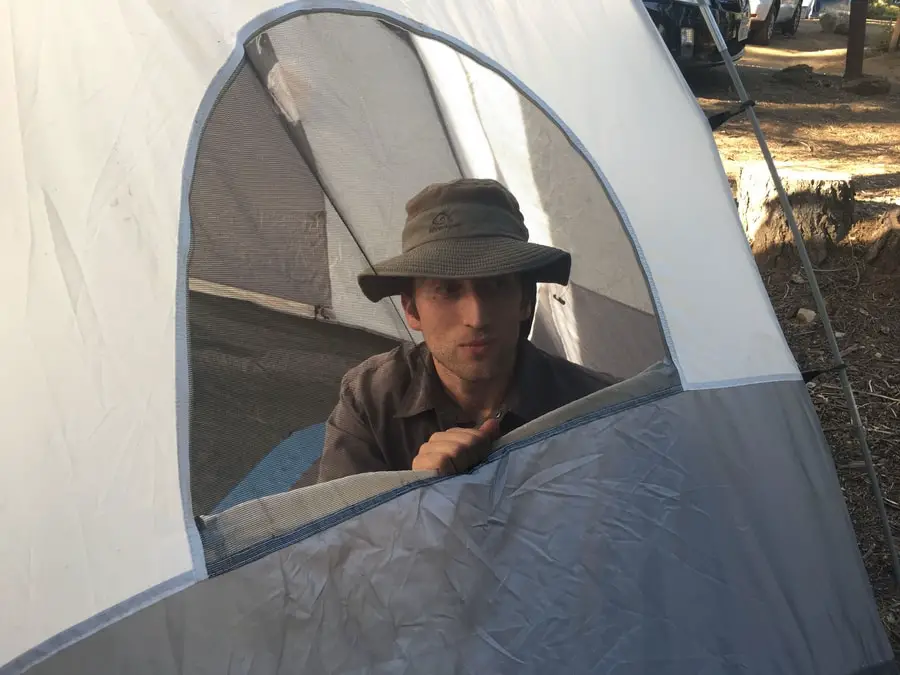
Most tents that are in good working order should be able to protect you from bugs. If you are using a tent that has seen better days then you might need to fix some things unless you want creepy crawlies inside your tent with you. The most likely entrance for bugs into your tent is the same front door that you use, especially at night if you are carrying a flashlight that they are following.
Keeping your tent closed whenever you are not actively entering and exiting is the best way to keep as many bugs out as possible. Also ensuring that your tent is in good working condition will help prevent small entrances for bugs. Bugs can be scary, but a huge majority of them are completely harmless. If you want an in-depth guide on keeping the bugs away while camping then you can read this full article that I wrote.
What Is The Most Dangerous Part Of Tent Camping?
The most dangerous part of a camping trip will surprise you. The most likely situation to be the most dangerous to you is the drive you make to and from your campground. According to the CDC “Each year in the United States, about three million people are nonfatally injured in motor vehicle crashes.”
Unfortunately, this data also concludes that “More than 100 people die every day in the US from motor vehicle crashes.” Driving is the most dangerous activity that most of us do nearly every day and the more you drive the more risk you are at. Please stay safe when driving, especially in unfamiliar areas when you go camping somewhere new.
Is It Safe To Leave Your Campsite Unsecured?
Another thing you might be wondering is if it is safe to leave your campsite unattended, especially with all of your camping gear. Theft at campgrounds is rare as most people that go camping are good people, but it does happen. The best thing you can do to prevent this is to secure your campsite.
There are basic things that you can do to minimize your chances of becoming a victim of theft while camping. The best thing to do is research the area before you go, and once you are there you should always lock up valuable items and keep your campsite clean and organized. Get to know your camping neighbors and look out for each other.
If you would like a full guide on how to secure your campsite then you can read this post because I go into much more detail on how to minimize theft while camping. If you are wondering if you should be locking your tent then read this post because there is a certain way that is most effective.
Is Camping Alone Safe?
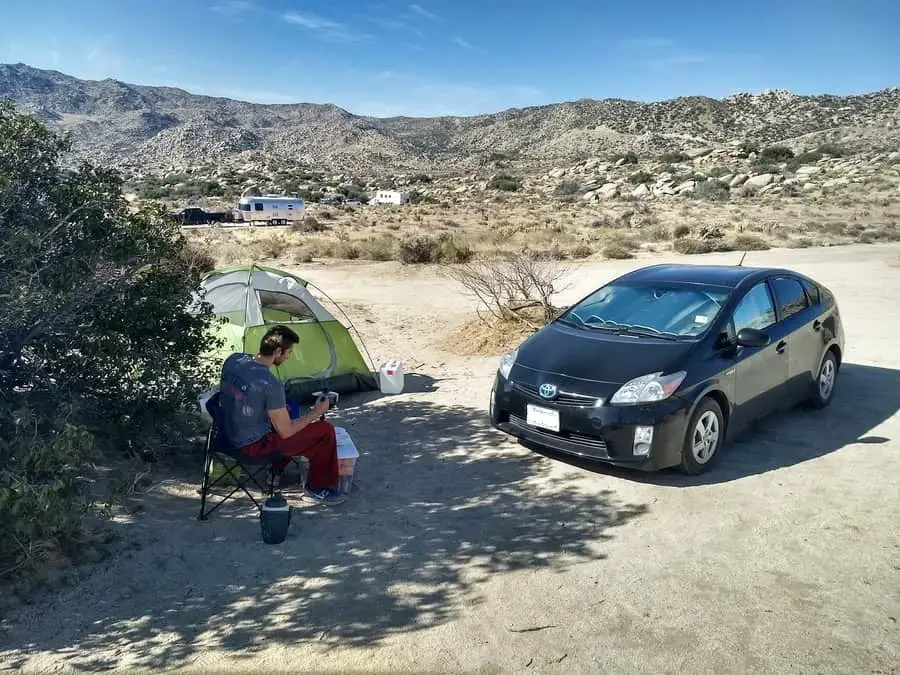
If you have read this article so far for this long then you probably already know what I am going to say. Yes, camping alone is safe and camping alone is not weird (article I wrote that addresses this). The best thing that you can do in order to ensure your safety while camping alone is to plan ahead.
Camping solo requires much more proper planning than group camping does. You will be responsible for yourself to bring everything that you are going to need. You also need to make sure that you tell someone in detail about your plans and when you will return. Solo camping safety overlaps greatly with general camping safety and if you need a full guide to safely camping alone then I would highly recommend you read this post that I wrote.
Other Tips For Safe Tent Camping
- Always bring at least a basic first aid kit
- Always let someone know of your camping plans and itinerary
- Drive only if you are well-rested and alert
- Bring more than enough water
- Choose your campsite wisely
- Practice proper hygiene while camping
Biggest Takeaways For Tent Camping Safety
- Keep your tent away from open flames
- Check weather forecasts before you go tent camping
- Leave your tent in case of lightning
- Bring appropriate gear and clothing
- Know that driving is the most dangerous part of camping
- Know that humans are the most dangerous animal
- Never bring food in your tent
- Research the area before you go
- Let people know where you are going
Related Questions:
Are Tents Toxic?
Modern tens are very safe and non-toxic. Keeping your tent clean and inspecting it regularly for mold is one of the best things you can do to ensure your tent does not become toxic.
What Are The Risks Of Camping?
The risk of camping is very low but camping can introduce you to risks of animals, insects, falling down, drowning, falling trees, falling rocks, thunderstorms, UV rays, extreme cold, extreme heat, etc.
My Favorite Camping Gear
- Air Mattress: click here
 to check out my favorite on Amazon.
to check out my favorite on Amazon. - Tent: click here
 to see my favorite tent available on Amazon.
to see my favorite tent available on Amazon. - Sleeping Pad: click here
 to check out the one I love on Amazon.
to check out the one I love on Amazon. - Sleeping Bag: click here
 to see the one I recommend on Amazon.
to see the one I recommend on Amazon. - Camping Stove: click here
 to see the best camping stove on Amazon.
to see the best camping stove on Amazon.


